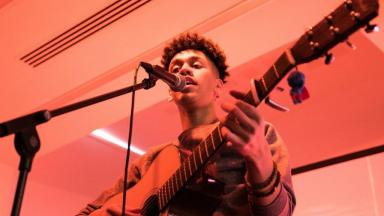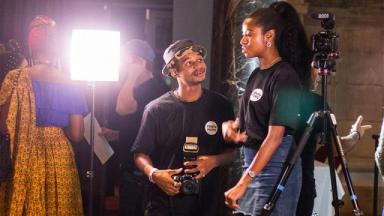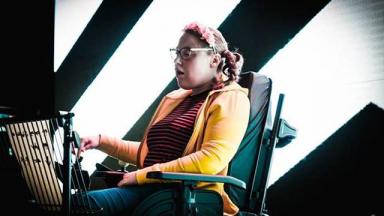Youth Music NextGen is a community of 18–25-year-olds who are pursuing a career in the music industries. We work with them directly through freelance opportunities, the Youth Music NextGen Fund, and our funded partners.
In 2019, we launched NextGen, offering 18-25-year-olds paid freelance work for Youth Music to help them gain valuable working experience. We conduct the NextGen Survey on a yearly basis to learn more about our relationship with them and hold follow-up interviews to explore individual journeys in depth.
We are always particularly interested to learn about how we are helping them towards their career aspirations, and what more we can do. This year’s NextGen Survey (2021) received 62 responses. Nine follow-up interviews were then conducted between September and October 2021.
Find out what this community of creative career starters told us below. We’ve also included a section about NextGen’s Proud Career Moments. This was written by a young person from the NextGen Community, Joh-Van Gillespie, who worked with us as our Research and Evaluation Intern.
Career aspirations
We spoke to NextGen about their ambitions to follow their passions and lead careers in areas spanning the industries:
“I might try and go into maybe PR in the music industry, or maybe something to do with marketing. But I'd like to stay in the music industry, I’m quite passionate about that.” - Nieve
“I would really like to write an album and I think that’s something that has felt so far away for so long and now I can feel myself getting a bit closer.” - Charity
“I’d like to be composing full time, I think. That would be a wonderful thing.” – Cameron
But they told us about the barriers they had faced when pursuing these ambitions, including issues relating to access and inclusion, a lack of industry experience and contacts, and financial barriers:
“Certain groups of people need a bit more help because there are barriers. There are social economic barriers that exist that impede on people’s success” – Cameron
“There’s lots of things that I’ve wanted to do, like SubmitHub and stuff like that. I’ve never done any of that because you have to pay, and I just thought I couldn’t do it because it racks up so quickly.” – Charity
Barriers like these, especially when compounded, can have a negative impact on the career ambitions. Being paid for work is essential at all stages of a career, yet just over a third of NextGen we surveyed had been paid for all the opportunities that they’ve accessed outside of Youth Music. Nieve, who had previously said they wanted to work in PR or marketing, revealed they had a larger ambition:
“In an ideal world, if I was being really aspirational, I'd quite like to have my own label.” – Nieve
Eva, who worked on two different Youth Music Incubator Fund projects, provided a similar response:“I think being a composer for TV or film would be probably my ideal kind of job, but if I could perform and write my own music and make a living from that, then that would be the dream” - Eva
Nieve and Eva talk about having an ideal or dream job, but believing that this may be unattainable, they also explore other options. Young creatives can also be dissuaded from pursuing their goals because influential voices deem them as ‘unrealistic’:
“From school, there's two ways of doing things. And it's either you're going down the creative route, which is always marketed to you as not paid well and kind of like, going against what your parents might have wanted. And then a corporate route, which is, you know, civil service and, like, achieving, but I think [you can do] both. You can be high-achieving, and also be creative, especially now that things are better paid, and you feel like you're valued for the work that you’re doing.” - Nieve
The creatives we spoke to also told us about their ambition to change the landscape of the music industries themselves, for the benefit of others. There were a variety of different routes named, like inclusive music-making, music therapy, becoming an opportunity provider for other young people, and making the music industries a safer space for women and non-binary people:
“In the long term, I’d love to qualify as a music therapist and practise music therapy.” - Eve
“I'm doing this project with the Lincolnshire music service where we're going around special schools and helping them develop their music curriculums. And I'm really enjoying that. So I will hopefully be doing more of that.” – Georgina
“I run a charity […] that’s all focused on breast cancer fundraising, but also abuse in the creative industries and recognising women and non-binary people as needing specific criteria for it to be a safer space. So yeah, I would love to just get people behind that” – Natalie
These attitudes and actions demonstrate this generation’s unique drive to reform the music industries from the inside, out. Find out below what some of NextGen’s proudest career moments have been. They often represent the key desire to innovate from within, pursuing head office-based opportunities as opposed to ‘talent’ roles in the music industries.
Youth Music and our Role
Youth Music has been providing paid freelance opportunities for 18–25-year-olds since 2019, to support young people in overcoming financial barriers. In the 2020/21 financial year, young people benefitted from 52 paid work opportunities offered by Youth Music, including roles such as Freelance Advisors, Contributing Writers and Co-Researchers. The opportunities provided helped their development, with 46% saying Youth Music opportunities have furthered their career progression to a good/great extent. This was a 6% increase from the 2020 NextGen Survey.
For many young people, it was also their first experience of being paid for a role in the music industries, helping to reduce the impact of financial barriers:
“The opportunity to be paid allowed me to leave my part time job and actually have time to do what I want to do career wise.”
There were other crucial benefits from working with Youth Music, like the opportunity to network. Our research report, A Blueprint For The Future, found that one of the barriers for young people attempting to enter the music industries is a lack of strong networks and industry contacts. But the young people involved with Youth Music were able to make these connections, with 38% having collaborated with someone as a result of their engagement with Youth Music:
“[Participation in a Youth Music funded project] Allowed me access to industry professionals and companies I would never have met with before.”
“Networking opportunities and further knowledge of the industry as a whole helped to set me up for moving forward in the industry.”
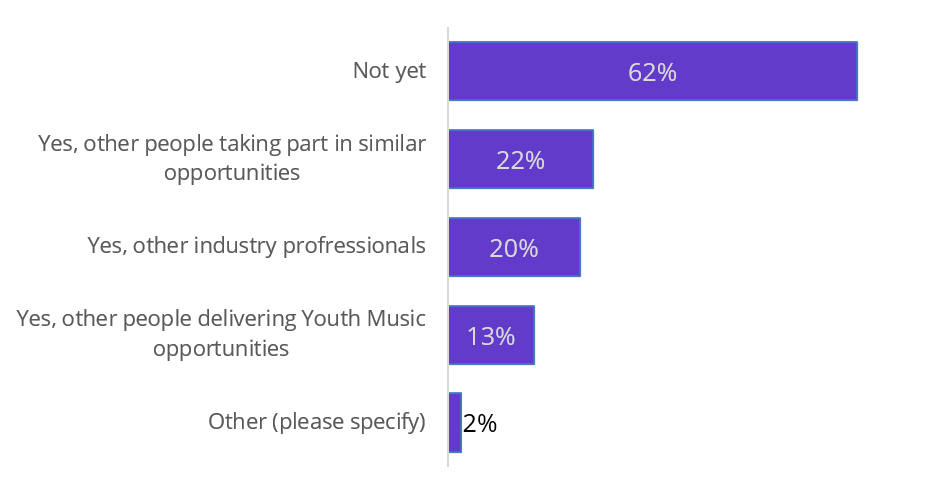
Have you collaborated with anyone as a direct result of your engagement with Youth Music? Please select all that apply. (n=45)
A lack of industry knowledge is often cited as a barrier for accessing music industries careers. We’ve worked with over 100 projects through the Youth Music Incubator Fund to invest in young people, by building their skills and knowledge through paid work. 100% of respondents who took part in a Youth Music Incubator Fund said that it had improved their knowledge of the music industries. Harry and Natalie, who separately took part in Youth Music Incubator Fund projects at record labels, spoke about their newly learnt skills and how this will help them in the future:
“I’m still confident that the opportunities that the Incubator Fund has given me, I would be able to go somewhere else and I’ve still got those transferable skills to make myself valued.” - Harry
“I learnt so much. ‘Cos obviously, being in events you don’t see a lot of the licensing and distribution. You do a bit of PR and stuff, but not on the level of sync deals and stuff like that, so that was really, really good.” - Natalie
These new skills and experiences, along with their developed networking skills, led many to feel more confident in applying for jobs and opportunities:
“My experiences developing and starting a record label [through an Incubator Fund project] have given me the confidence to apply for positions within the music industry and focus on developing a career within it.”
“I was employed as a co-researcher for Youth Music in April 2021. This was an extremely rewarding position to be involved in, it reminded me why I am passionate about community arts and music; it allowed me to hear young people's experiences having access to music and using it as a therapy. This has shown me that I am interested in research roles and I hope to pursue more in the future.”
“I have increased my technical abilities in both music production, mix engineering and general networking and communicational skills, allowing me to network outside of Youth Music and unlocking further opportunities.”
As a direct result of engaging with Youth Music, members of the NextGen community have secured 24 employment opportunities. There have also been 11 training opportunities, 9 education opportunities, and 8 funding opportunities.
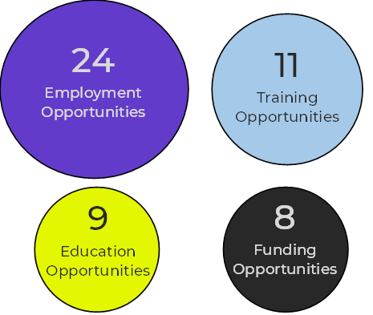
NextGen's Proud Career Moments
Written by Joh-Van Gillespie, Research and Evaluation Intern
23 young creatives shared their experiences of unique moments that brought them pride and created career milestones. The majority of the answers reflected positive and defining experiences: with many respondents progressing within their careers, starting new jobs and for some, leaving jobs.
Many respondents shared with us that they experienced being compensated for their work for the first time. Youth Music’s A Blueprint For The Future report found that only a small proportion of people entering the music industries are able to earn sufficiently, with 64% of musicians finding difficulty in pursuing music due to a lack of sufficient pay. The music industries are incredibly hard to pursue for young people, who face a multitude of barriers trying to navigate it. When more young people are compensated for their work, it lessens the need for additional income, allowing them to focus on pursuing their careers while being paid. One of the respondents mentions pursuing a freelance advisor position with Youth Music as the first time they were “paid for their work”. This is why the Youth Music NextGen Fund and Youth Music Incubator Fund were created - to level the playing field and give opportunities to all young people.
“Getting a freelance advisor position with Youth Music, not only was it in an area which I am extremely interested in, but it was also the first time I had paid work.”
Furthermore, the opportunities provided within youth-centred organisations like Youth Music speak to a wider need for the music industries to facilitate similar avenues for young people. Investigated in A Blueprint For The Future, change is coming via the collective desire for change and the need for “successful companies (to) establish working cultures where young team members feel supported to succeed”. The industry is slowly evolving with the increasing demand for a more equitable environment. The rise of social media has also created a space for all to share their ideas, concerns and wants for the music industries, where young people are at the centre. This is evidenced in some of the respondents’ proud career moments being social media-focused opportunities. It is becoming more apparent how vital young people are in driving change within the music industries.
“Working on the Youth Music funded Girls I Rate Get Heard project was amazing, and my career highlight was creating content and copy to go on Tinie Tempah's social media.”
“I have started to build my YouTube channel in which I’m uploading DJ Mixes (and planning on uploading tracks in the future). I have amassed over 4,000 subscribers, and just over 2.4 million views on my mixes.”
Some respondents expressed an interest in head office-based opportunities rather than ‘talent’ roles. This shows that young people are exploring other roles within the music industry by becoming more familiar with the different sectors. Perceptions surrounding the music industry are often focused on ‘talent’-based roles. Yet NextGen and Incubator Funded projects work to ensure that both on stage and behind the scenes roles are there to develop young people’s skills, as they all contribute towards the rich landscape of the music industry.
“I did the sound engineering for my first ever live gig with no help, the gig ran really smoothly, and I was absolutely buzzing afterwards, I was so proud of myself”
In conclusion, the responses to the question have shown to be majority positive in tone, with the respondents obtaining or creating opportunities for themselves. This points to a larger discussion on how the young people of today are less likely to settle and are more likely to change these industries for the better. Often, young people entering the industry look at it with apprehension, when it comes to leading with equity. With that being said, the responses from these participants of Youth Music opportunities show a step in the right direction towards shaping a better industry.
“Working on The Rising for Platform B was a very proud moment for me. I had never produced a breakfast show before and so working every weekday for 4 months on an engaging and interesting show was incredibly affirming and gave me belief in my skills to organise, research and discuss ideas with my team. I felt I had a lot of responsibility for how the show was received and I know a lot of listeners really loved listening to us every day throughout lockdown. We also interviewed a lot of incredible up and coming artists and bands and hosted in-depth discussions and raised awareness of important issues.”
“I played at Rescue Rooms in Nottingham which has been a venue I've wanted to play since I moved here. I did it solo and with all original songs and I thought I would never get to that point, so I am really proud of myself!”
Accessibility and Inclusivity
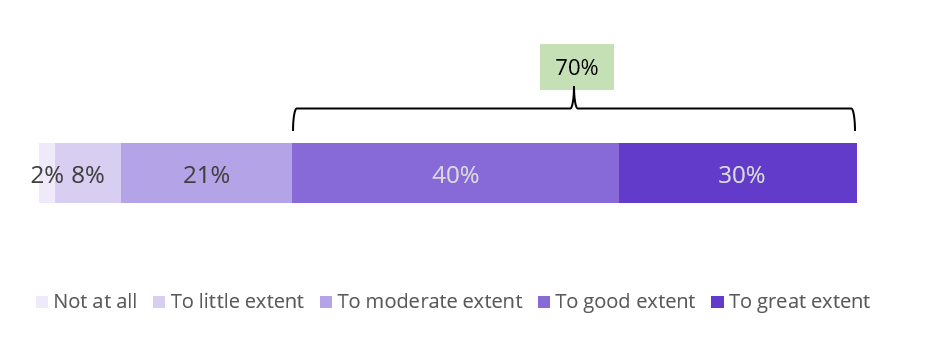
To what extent do you find opportunities Youth Music offer to be accessible? (n=53)
Youth Music is dedicated to providing opportunities for young people with accessibility and inclusivity at the forefront of our approach. This was reflected by 70% of respondents telling us that Youth Music opportunities are accessible to a good/great extent. Accessibility is practiced through many forms. Our accessibility was experienced by the NextGen community in different ways, such as the visibility and publicity of our opportunities:
“I am always able to easily find appropriate opportunities on the website.”
“Many opportunities come and go via email, with good time to apply and research about them.”
And the accessible nature of the application process:
“Application process always seems to offer different options rather than just traditional job applications of CV and cover letter.”
“They are easy to apply for and always make it clear that accessibility issues are accommodated for.”
As well as the comments on the general accessibility of Youth Music, some respondents spoke about how we had accommodated them, specifically:
“I have a disability and I’m from a lower socioeconomic area/background, and Youth Music has always been accommodating and considerate to these factors.”
“Youth Music has always been very considerate of the individual needs of participants. They are always looking for ways to improve, and to better support everyone they work with.”
Our approach led one interviewee, Natalie, to describe Youth Music as “definitely one of the most accessible ways to get into music”.
Issues of accessibility also relate to inclusivity. We asked the young people we interviewed to say what inclusivity meant to them. The common themes were equal opportunity and an acceptance of everyone, with no exclusion due to factors outside of skill and will:
“I think it's important that there's not only equality, but also equity in the industry, which is something that sort of gets brushed under the rug.” - Cameron
“I guess, inclusion to me is just accepting everyone’s voices. So not having a bias. We all have some kind of unconscious bias, but when you're doing applications, there’s a transparent process. And know that you're not being judged on anything that was surface level.” - Nieve
“Music is the thing. It’s the reason why they’re there and not anything else.” – Charity
“Inclusion is just the sense of belonging” - Mai
There was a general agreement among the young people we spoke to that Youth Music aligned with their views of inclusivity:
“It's a problem that you do need to tackle at a grassroots level, it's lovely to see that there is that drive [at Youth Music].” - Cameron
“It shouldn’t be the main thing: who you are, your background and your upbringing. I think the music is the most important thing and that’s what I like about Youth Music.” - Charity
“Youth music made me feel more included in the music industry.” - Mai
This was also reflected in the survey results, with 87% saying that Youth Music are to a good/great extent, inclusive in their approach to creating opportunities for young people.
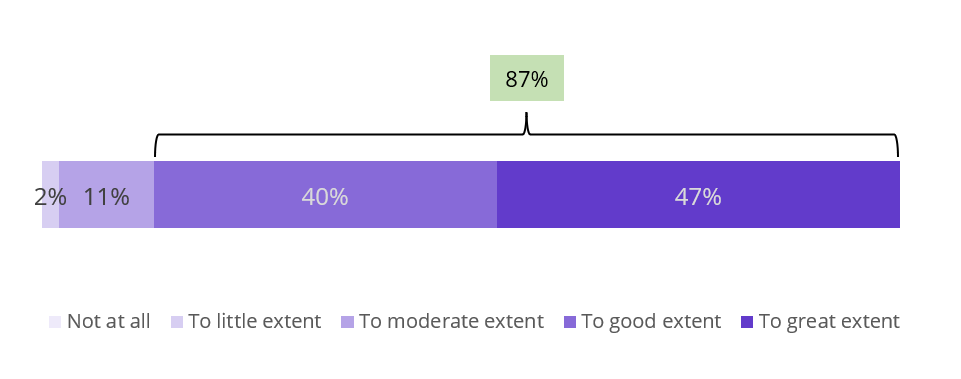
Would you say that Youth Music are inclusive in their approach to creating opportunities for young people? (n=53)
Where we can improve
One of the key benefits from conducting this survey, along with the interviews, is to find out suggestions for improvement directly from young creatives. Due to limited resources, we’re not able to action all of the suggestions. But we’re taking these points on board for the future development of the NextGen community and grants programmes. A key theme in both the survey and interviews is the want for increased contact between Youth Music and members of the NextGen community:
“What would be cool, is perhaps a little bit more collaboration with Youth Music. You know, the end product or halfway through the process, you and the interns just to team up, just to add another collaborative name into it” - Eve
“I do have quite a good idea of what I’m doing but it would be nice to be reassured a little bit. I know we have calls and stuff that still need to be set up. But yeah, probably a bit more contact would be good for me.” – Charity
“I think that it would be good for Youth Music to specifically get feedback direct from participants on funded projects. As I know feedback comes from project co-ordinators, but it would be nice if participants were able to directly tell the funders about their experiences, both positive and negative as I feel this would be meaningful and helpful for both groups.”
As well as increasing our contact with the NextGen community, it was also suggested that we could increase our presence and brand awareness within the industries:
“Do a variety of events targeted at different genres and different areas to draw in more diverse crowds and diverse applicants.”
“Reach out to young people through university projects led by students.”
“I think it would be nice to see Youth Music more. Because the first time I saw it was on an advert. So it’d be nice to have seen the organisation before because I think what you do is really good.” - Nieve
Other areas noted in the survey included broadening the criteria for funding, creating more opportunities for those without previous work experience, and facilitating more networking opportunities:
“A lot of the jobs seem to be limited to people aged 25 and under. Maybe the upper age limit could be slightly increased”
“Ensuring that prior experience in certain areas is not always necessary as not all of us have had the financial means to gain this early on”
“Potentially a Youth Music ‘portal’ in which several participants can network with each other and collaborate”
“If possible have a networking event, or speed networking event, where other creatives meet!”
We’re collecting data in this year’s NextGen survey on what kind of networking events Youth Music can set-up for the NextGen community. Have your say, and complete this year’s NextGen survey here.
Final notes from NextGen
Finally, we asked survey respondents if they had any additional general feedback for Youth Music.
“Thank you for the opportunity it's been amazing!”
“Just a genuine thank you to the organisation, it's allowed me to breathe life into to the person I’m becoming, I’m grateful.”
“I couldn't have achieved as much as I have without Youth Music - it's been so invaluable.”
And several comments acknowledged the importance of the opportunities on offer to young creatives:
“I really think the opportunities you have available are so important for young musicians and thank you for creating a space for us!”
“Keep doing what you're doing! A vital resource.”
“Keep up the good work! I check in daily for project and learning opportunities so I can't wait to see what the future holds!”
Methodology
The NextGen Stakeholder Survey is an annual survey to explore how much impact we are having and what more we could do to facilitate the development of young creatives’ careers. Respondents can then opt-in for a follow-up interview with our team. Interviewees included NextGen that had applied to freelance opportunities, the NextGen Fund and young people that had or were taking part in Youth Music funded projects at the time of interview.
In both the survey and the interviews, we asked respondents to tell us a little about the opportunities they had accessed to date (both through Youth Music and elsewhere), how they had impacted on their career progression and the proud moments they’ve experienced in their journey so far. Direct quotes within this report are those of survey respondents, unless otherwise specified.
Are you aged 18-25 and chasing a career in music, but finding it tough, closed off and hard to break in to? Start finding your way in with Youth Music's NextGen Community. By signing up you'll be the first to get information about our funding for young creatives, freelance work, as well as job and training opportunities. Join our NextGen community here.
Thanks to players of People's Postcode Lottery for supporting Youth Music's work with young creatives.
Find out more information about our different grant programmes here, and our funded partners here.
You may also like...
Youth Music Self-Expression Report
Read our new report exploring the links between songwriting, self-expression and wellbeing in young people.
Reshape Music report
Our report sets out the significant barriers faced by Disabled musicians to access music education and music-making.


